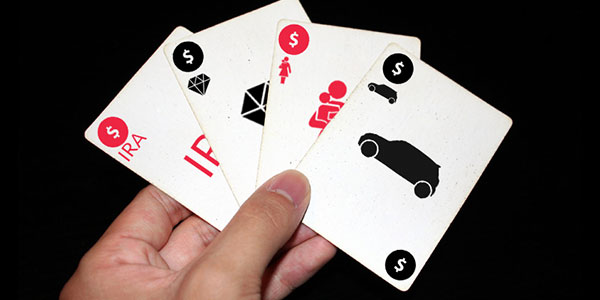
Wildcard exemption holds a special place in Chapter 7 bankruptcy typically because it allows debtors to save their unprotected assets. This means bankruptcy filers can save those properties from getting liquidated that are usually not covered under normal federal exemptions.
Properties debtors can keep under federal exemptions
Under federal exemptions the debtor is allowed to keep:
- Alimony and child support
- Homes having equity less than $ 17, 425
- Unemployment insurance
- Pensions and IRAs
- Personal items up to $9,300
- Jewelry and Clothes
- Vehicles and other public benefits
Types of assets that come under wildcard exemption
Wildcard exemption can be applied to the following kinds of assets:
a) Non-exempt property: If the debtor uses wildcard to protect the non-exempt property, then that property will be treated as if it were exempt up to the used wildcard dollar amount.
How wildcard exemption works:
You’ve a violin worth $3000 that you want to preserve. But, musical instruments are not exempted in your state. However, it does offer wildcard exemption upto the amount of $5000. So, you can use $3000 of wildcard exemption for your violin and save it. You’ll have $2000 in your hand. You can very well use it to save another non-exempt property.
b) Partially exempt property: Under federal law, certain assets are exempt, but only up to a certain amount. In case of these assets, the wild card exemption may compensate for the difference and allow the debtor to keep that property.
How wildcard exemption works:
You own a car worth $6000 and your state’s motor vehicle exemption is up to $3000. In case your state’s wildcard exemption is around $3000, then you can use it to save your car. This would imply that you’ve exhausted your state’s wildcard exemption completely. You won’t be able to use it to protect any other non-exempt asset in your state.
c) Cash: The debtor can even get cash and bank funds exempted with wildcard exemption. The debtor can apply wildcard exemption to protect any of his property, but in some states, it is applicable to only personal properties.
However in some cases, the federal homestead exemption can also function like a wildcard. If the debtor does not own a home, or does not have enough equity on his/her home mortgage to use up the homestead exemption, then 50% of homestead exemption can be used like the wildcard exemption in order to cover the debtor's personal property that was not included in the actual wildcard exemption.
How much can you protect through wildcard exemption
It totally depends upon the state you reside. Read below to get a clear idea.
Federal wildcard exemption - The total dollar amount of wildcard exemption allowed is $1225 plus any unutilized part of federal homestead exemption up to $12,250. However, if you’re filing bankruptcy alone and don’t have home equity, then the federal wildcard exemption amount will be $12,725.
Keep it in mind that whether or not you can use federal exemption depends upon the state wherein you reside. Certain states permit you to use federal bankruptcy exemptions rather than state exemptions, other states do not.
State wildcard exemption - Certain states do offer wildcard exemptions whereas others don’t. But the total amount differs from state to state. Some states give you the option to use the unutilized portion of your homestead for any other type of property.
States where wildcard exemption can be used
States wherein wildcard exemption can be used in straight bankruptcy are:
- Arkansas
- Connecticut
- District of Columbia
- Hawaii
- Massachusetts
- Michigan
- Minnesota
- New Hampshire
- New Jersey
- New Mexico
- Pennsylvania
- Rhode Island
- Texas
- Vermont
- Washington
- Wisconsin
So, if you are a Chapter 7 bankruptcy filer hailing from any of the above mentioned states, then you can have recourse to wildcard exemption and save most of your cherished possessions from the clutches of liquidation.
Here it is important to remember that the dollar amount of the Wild Card Exemption keeps on fluctuating depending upon inflation. So, do look out for the updated dollar amount whenever you file for Chapter 7 bankruptcy in your state. Also consult a reputable bankruptcy attorney to help you file your case, safeguard your interests and guide you effectively though the bankruptcy procedure.
Wildcard exemption frequently asked questions
1. Where can you get wildcard information in bankruptcy?
Your bankruptcy attorney can give you all the information you need. Besides, wildcard exemption forum and post your questions.
2. Can you save properties through wildcard exemption in Indiana?
Well, you can use wildcard exemption in Indiana and save up to $9350 of non-residential properties. However, do keep it in mind that you can won’t be able to use it to save your residence or bank deposits or stocks.
3. What about the Illinois wild exemption in bankruptcy?
You can take advantage of wildcard exemption in Illinois to keep $4000 of personal properties or any other asset that isn’t covered under normal bankruptcy exemptions. But this excludes your wages.
4. Can you use wildcard exemption in California?
Yes, California has a generous wildcard exemption laws. You can take advantage of these laws to protect your valuable assets.
5. How does wildcard exemption in New York work?
You can keep properties through wildcard exemption in New York only upto a specific dollar amount. If you’re using New York bankruptcy exemptions, then you can save up to $1000. However, if you choose federal bankruptcy exemptions, then you can save up to $12,725 worth of assets.











